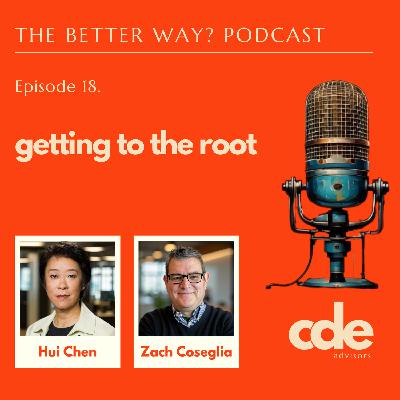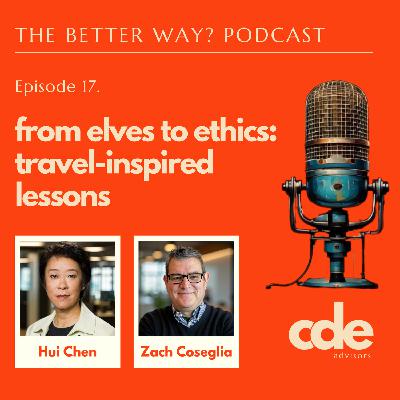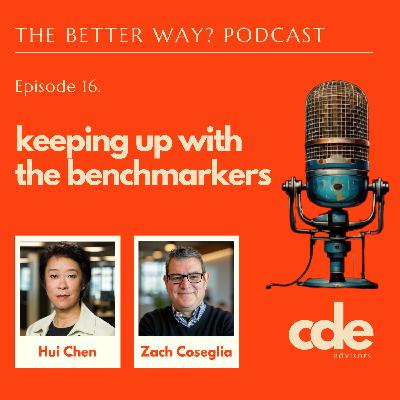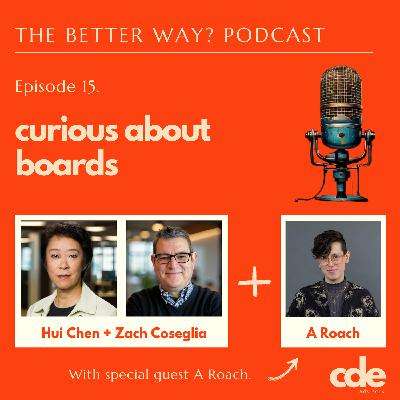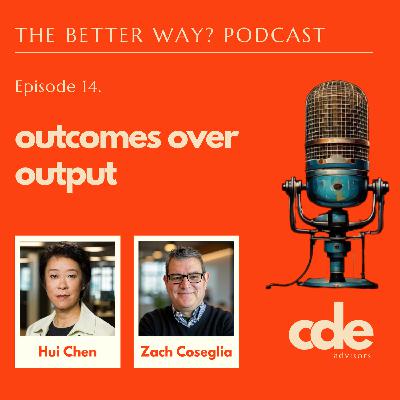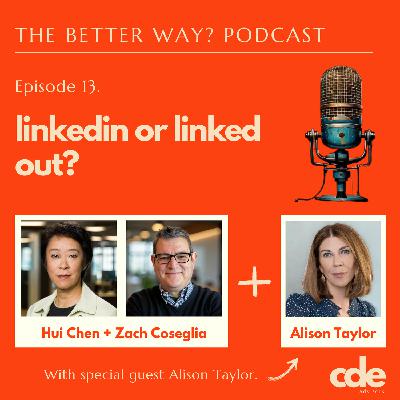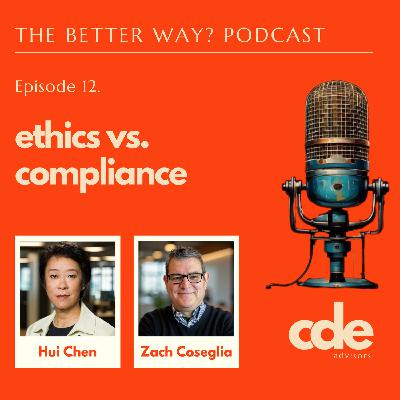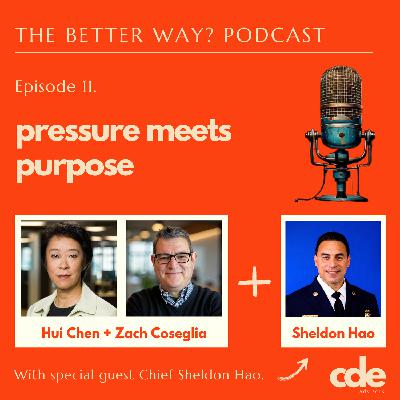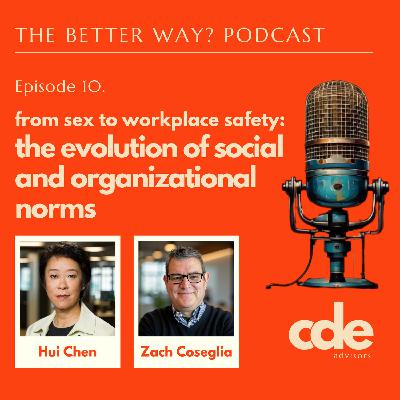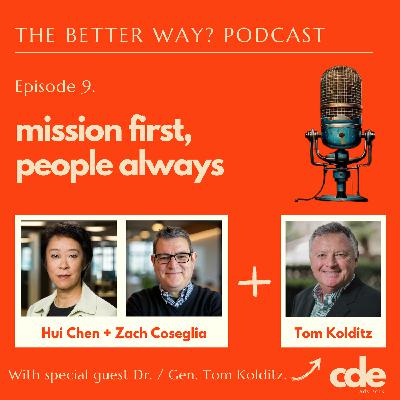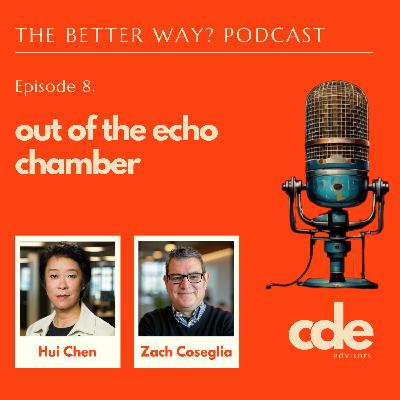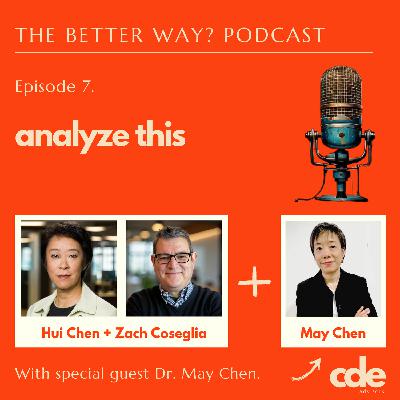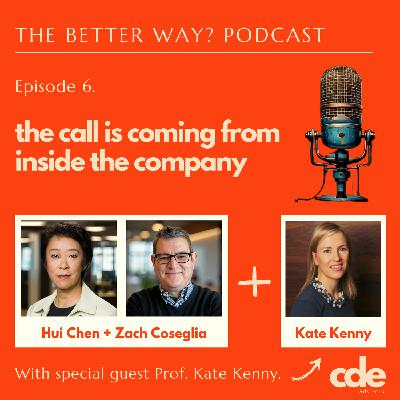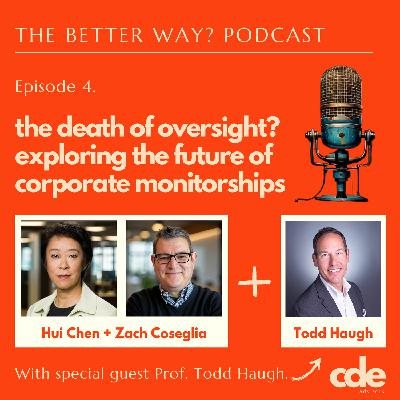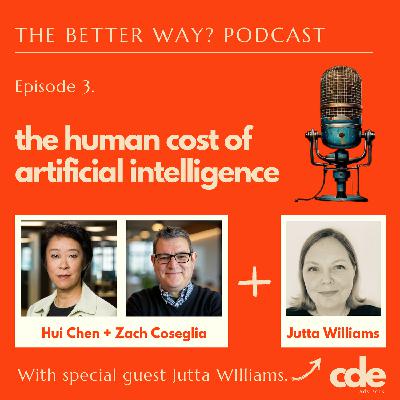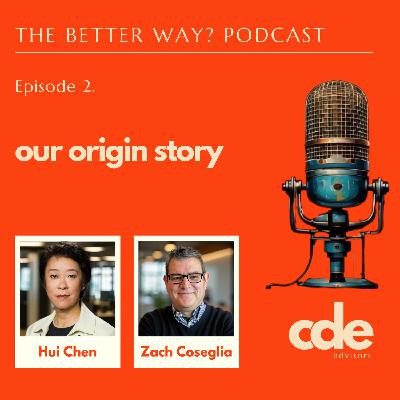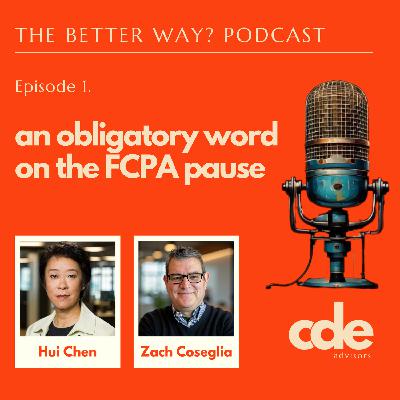Discover The Better Way? Podcast
The Better Way? Podcast

The Better Way? Podcast
Author: Culture. Data. Ethics. | CDE Advisors
Subscribed: 0Played: 0Subscribe
Share
© Copyright 2025 | CDE Advisors LLC
Description
This is a curiosity podcast. For those who find themselves asking: “There has to be a better way, right? There just has to be.” Join Hui Chen and Zach Coseglia as they explore the worlds of organizational culture, data, and ethics—and search for new ways to tackle long-standing challenges.
18 Episodes
Reverse
Root cause analysis isn’t just a box to check—it’s the difference between fixing symptoms and solving real problems. In this episode, Zach and Hui unpack why so many organizations stop short of the true root causes, settling for easy answers like “more training” or “rogue employee.” They explore how curiosity, context, and critical thinking can transform investigations from blame games into learning opportunities.From the five whys to fishbone diagrams, they share practical methods for digging deeper and highlight why cultural and systemic factors often lurk beneath the surface of compliance failures. Along the way, they connect lessons from NASA’s Challenger disaster and Deepwater Horizon to everyday compliance challenges, showing how disciplined analysis and data-driven insights can prevent repeat mistakes and build stronger, smarter programs.
What do Icelandic elves, Chilean political ads, and Uruguayan tea rituals have to do with ethics and compliance? More than you’d think. In this episode of The Better Way?, Zach and Hui take you on a global journey—literally—sharing travel stories that spark fresh insights into culture, data, and the human side of corporate integrity. From folklore that reveals workplace truths to a cruise ship complaint that becomes a case study in speaking up, this episode is packed with unexpected connections, sharp observations, and a whole lot of curiosity. Whether you're a compliance pro or just love a good travel tale, this one might make you rethink how we measure, motivate, and manage culture and compliance.
It’s human nature to be curious about what other people are doing. But is it helpful. And is benchmarking just a modern day, corporate version of our naturally human instinct to "keep up with the Joneses?” In this episode of The Better Way?, Zach and Hui dive deep into the widely used, yet often over-valued, practice of culture and compliance benchmarking. They define it, explore why organizations do it, and acknowledge its potential to inspire (and maybe even help you find “better ways”). But they also caution against over-reliance, arguing that benchmarking-based comparisons usually lack the context necessary to be truly meaningful. Understanding what others are doing can be helpful to charting your own course; but when things go wrong, there is rarely strength in numbers. And who the heck are the Joneses anyway?
In this episode of The Better Way?, Zach and Hui welcome investigative journalist Anna (A) Bianca Roach for a conversation about the intersection of corporate strategy, ethics, and global risk—and the evolving priorities for today’s corporate boards. Drawing from experience reporting for Agenda, a Financial Times publication, A shares insights into what keeps boards up at night: from tariffs and supply chain complexity to the murky waters of AI oversight and education. A, Hui, and Zach explore the nuanced reality behind corporate DEI and climate commitments, where public silence doesn’t always mean inaction—and how short-term shifts in public transparency may have long-term effects on public trust. The conversation closes with reflections on immigration policy, the environmental cost of AI, and the importance of asking “dumb” questions . . . because sometimes, that’s where the smartest answers begin. A also also reflects on their journey from multilingual childhood in Switzerland to a career in journalism shaped by curiosity and interest in cross-border collaboration.
It’s easy to measure output. How many trainings. How many policies. How many messages. All "the things" we did to protect the company and shape a culture of ethics and integrity. But did any of those things work? And what does it even mean for something to “work"? In this episode of The Better Way?, Zach and Hui focus on the distinction between output and outcome—and advocate for a mindset of experimentation and verification. Drawing parallels to healthcare and public safety, they emphasize that true effectiveness involves behavioral change, risk reduction, and cultural alignment. But they also acknowledge that this is hard—so much harder than tallying up output. From FOFO (fear of finding out) to data access challenges, they unpack (some of) the reasons why compliance often falls into the output trap. And in the end, they call for a fundamental shift in mindset: one that starts with defining your desired outcomes, collecting meaningful data, and being brave enough to test whether what we’re doing is working.
In this episode of The Better Way?, Zach and Hui welcome back Alison Taylor (NYU professor, ethics expert, and celebrated author of Higher Ground) for a candid conversation about LinkedIn. Yes, you read that right! We're dedicating an episode to LinkedIn. What starts as a lighthearted look at LinkedIn etiquette (Alison’s pet peeve posts inspired the episode) evolves into a deeper exploration of how professionals use the platform to build voice, share ideas, and navigate the tension between authenticity and self-promotion.Together, the trio unpacks the paradoxes of “influence,” the frustrations of the algorithm, and the echo chambers that often form in professional circles (a topic we’ve separately dedicated an entire episode to). They reflect on the platform’s role in shaping modern discourse and the broader implications for how professionals connect, communicate, and build credibility in a digital world. Whether you’re a lover of LinkedIn, think it’s the height of cringe, or both, the dynamic Alison Taylor is always worth a listen.
There’s a difference between doing “what’s required” and doing “what’s right.” And if you’ve been paying attention, you know that we’ve also done whole episodes on the shortcomings of “do the right thing” language. So, in this episode of The Better Way?, Hui and Zach thought it was time to give ethics the explicit spotlight it deserves. It is, after all, our “E.” They start by unpacking the differences between compliance (think: rules, regulations, and external demands) and ethics (think: values and the messy beauty of human judgment). Then, through a combination of historical lessons and real-world dilemmas, Hui and Zach dig deep into the role of today’s “ethics and compliance” officer. What does it mean to wear “ethics” as a badge? And are those who carry the badge truly empowered to be the conscience of their companies—should they be? As always, they end with tips for navigating the complexities of today’s workplace, with a focus on having the moral courage to initiate the sort of difficult conversations that make organizations better.
We often hear people in our world say that they’ve spent their day “putting out fires.” Yeah? Well, we thought, why not talk to someone who has spent his career putting out actual fires—and who leads one of the most dynamic fire departments in the United States? In this episode of The Better Way?, Zach and Hui sit down with Sheldon Hao, Chief of the Honolulu Fire Department, for a conversation about leadership and decision-making on the front lines of emergency response. Drawing from decades of service, Chief Hao offers a behind-the-scenes look at how firefighters make split-second decisions; train for the unexpected; and shape a culture rooted in family, service, and resilience. From managing emergencies in real time to using data for long-term strategic planning, Chief Hao’s insights are as applicable in business as they are in the firehouse.
Shaping culture can be a daunting task. Because change doesn’t happen overnight. But our world is filled with examples of shifting norms in both the social and organizational contexts. Just think about how much has changed in the last fifty years—or even, the last five!In this episode of The Better Way?, Hui and Zach, as they often do, find inspiration in unexpected places; with examples from politics, pop culture, business, and education, they remind each other that big change is possible, and can happen swiftly. From representations of sex and gender norms on television; to the cultural transformation Paul O’Neill led at Alcoa; to the campaign to promote designated drivers (and more!)—they’ll share nuggets of inspiration that can enrich the work we all do every day.
Leadership is a recurring theme on the pod. So, as they’re wont to do, Hui and Zach sought out an important voice to dive deep into leadership and leadership development: Dr. Tom Kolditz, a retired Brigadier General (U.S. Army), psychologist, author, educator, and leadership coach. In this episode of The Better Way?, General Kolditz shares insights on trust and leadership in times of crisis—from combat zones to corporate boardrooms. He also challenges us to rethink traditional assumptions about authority and leadership, and makes a compelling case for follower-focused, adaptable leadership. From the ethics of diversity and inclusion (including a detour into current events, like recent plans to rename certain DOD installations) to the importance of listening and managing dissent, this conversation is all about what it means to lead with purpose and integrity in any context.
This series is all about curiosity in the search for “better ways.” And that search has taken us to some unexpected places: we’ve talked to an award winning actress; data scientists; AI ethicists; behavioral scientists; psychologists; lawyers; an auditor; and many others. We’ve also drawn inspiration from congress, religion, academia, the military, sports—and of course, from the world of business.In this episode, Zach and Hui talk about the importance of getting out of the traditional culture, compliance, and ethics “echo chamber”; why many of the most prominent conferences on these topics (and it seems like there’s been a lot lately) fail to deliver; and they each share three unexpected sources of inspiration (from pop culture to 15th century history to modern medicine). And most importantly, they get specific; about how each of these areas inspire them—and what they teach us about our work.
Psychology is increasingly a topic of interest to practitioners in organizational ethics, compliance, and culture (as it should be!). But do you know who we don’t hear from enough on the topic? Actual psychologists. Call it a “better way,” or just common sense, Zach and Hui decided to address that, by starting a conversation with noted clinical and organizational psychologist, May Chen.The conversation with Dr. Chen begins with a discussion of her curiosity-fueled professional journey. They cover her early career merging psychology and consumer marketing; her experience as an academic and researcher; and her work as a consultant, advising global companies on new additions to their executive ranks. Along the way, Dr. Chen offers insights about organizational culture; the importance of leading with empathy; the role of assessments; the difference between “ethics” and obedience; and why “diversity,” in all its forms, is critical to building a winning organization and team.
We are always urging people to "Speak Up": and we have policies, procedures, and hotlines to facilitate "speaking up". But what motivates people to do it? What inhibits speak up? Who are the one's speaking up? And why? In this episode of The Better Way?, Zach and Hui are curious to learn more about the dynamics, complexities, myths, and challenges of “speaking up”—and “whistleblowing,” more broadly—from a true expert on the topic. Enter Professor Kate Kenny, a leading researcher and author on the topic, whose new book, Regulators of Last Resort: Whistleblowers, the Limits of the Law, and the Power of Partnerships, explores how public whistleblowers prevail despite employers' attempts to silence them.Zach, Hui, and Prof. Kenny bust some common myths about those who make disclosures (like, for example, that all so-called “whistleblowers” are “outsiders”). They discuss the language we should use within an organization to describe speaking up (spoiler alert: stop using the term “whistleblower”). And they use headline-grabbing cases to illustrate the cultural and behavioral dynamics that influence, and sometimes inhibit, individuals’ willingness to speak up about observed misconduct.
The role (and importance) of organizational culture seems to be well understood—in driving business performance, attracting and retaining the best talent, and as a force-field protecting against unethical decision-making and other forms of misconduct. But does all the talk live up to the hype, especially in anxious times? In this episode of The Better Way? podcast, Zach and Hui start a conversation about what we mean by “organizational culture”; the importance of knowing who you are and what you value; and why words, slogans, or marketing alone will never successfully shape culture. They also discuss the challenges organizations face during anxious times; and how an organization’s response can either reinforce—or undermine—it’s stated values.
Corporate monitorships have been in the news a lot lately. From the Department of Justice’s decision to terminate the Glencore monitorship early; to months of headlines about a proposed monitorship associated with Boeing’s guilty plea in the 737 Max criminal case. And so, in this episode of The Better Way?, Zach and Hui, along with special guest Todd Haugh, an associate professor at Indiana University’s Kelley School of Business, ask, well . . . what the heck is going on!?They also dive deeper into a recent paper co-authored by Hui and Todd called, “Remaking Monitorships: A First Principles Approach to Monitor Effectiveness.” In their paper, and in this discussion, Todd and Hui make the case for improving, not eliminating, monitorships. Topics include defining monitorships (which is trickier than you might think); the importance of measuring monitor effectiveness; the need for multidisciplinary monitorship teams; and an ongoing debate about diversity, equity, and inclusion in the monitorship space.
Finally, our first guest in the new era of The Better Way? podcast! In this episode, Hui and Zach are joined by Jutta Williams, an experienced compliance, privacy, and information security officer—and a noted responsible AI evangelist. Jutta shares her deep knowledge of this curious—and misunderstood topic—in the most relatable and accessible way. Together, they define key terms; explore (some of) the ethical and strategic risks associated with AI; and then, dive deep into a human-centric approach to AI governance—and to the design and validation of AI systems, more broadly. Be sure to stick around for a striking story about the “human cost” of data. Oh, and of course, this also marks the return of the Better Way? questionnaire.
We always try to start with “why.” And over the last ten or so months, we’ve been asked “why?” a lot—why we’ve been on hiatus for so long and why we left our prior firm. In this episode of The Better Way?, we do our best to answer those questions, while also (and more importantly) sharing the foundational “why” behind our new venture. In addition to talking about data-driven, human-centered, and evidence-based culture, ethics, and compliance, we discuss: entrepreneurship, the importance of timing, building a different type of consultancy (influenced by a combined decades of experience as the client), taking your own advice, and the importance of protecting an idea that you deeply believe in.
It’s many been months since our last episode, but The Better Way? Podcast is back! In this (our sort of first episode), Zach and Hui return with a special—and timely—discussion about the implications of President Trump’s Executive Order pausing FCPA enforcement. They address the role FCPA enforcement has played in the development of corporate compliance programs, generally, and in the creation of a broader FCPA “industrial complex.” But this is mostly a forward-looking episode. Zach and Hui share go-forward opportunities for ethics and compliance professionals—opportunities to reevaluate their role, push back on fear-based compliance, and become a new kind of business advisor. Above all, though, they make the case that the pause, while among the hottest topics in compliance, is far from the preeminent ethics issue of our time.


